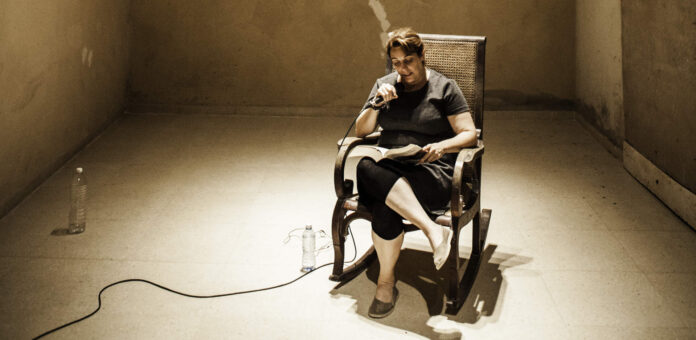The artist and activist Tania Bruguera presents her performance Where Your Ideas Become Civic Actions (100 Hours Reading The Origins of Totalitarianism), a 100-hour reading of Hannah Arendt’s Elements and Origins of Totalitarianism at Hamburger Bahnhof – Nationalgalerie der Gegenwart. Artists, theorists, activists and visitors will read the political theorist’s magnum opus in the museum’s historic hall without interruption, day and night, from 7 pm on Wednesday, 7 February 2024 until 11 pm on Sunday, 11 February 2024. Bruguera’s first performance in Cuba in May 2015 led to her imprisonment by the Cuban authorities. The Hamburger Bahnhof is now showing the European premiere. Admission to the performance is free.
The historic hall of the Hamburger Bahnhof will be open to visitors free of charge for 100 hours without interruption: Cuban artist Tania Bruguera (born 1968) will read from Hannah Arendt’s (1906-1975) book ‘The Origins of Totalitarianism‘. Arendt’s history and theory of totalitarianism, published in 1951, which deals with the complex issues of totalitarianism and imperialism, and anti-Semitism and racism, is still very relevant today. While reading (in German and English), Bruguera alternates with public figures, theorists from various fields of knowledge, artists from different disciplines and people from the museum’s neighbourhood to reflect together on power and violence, plurality and morality, politics and truth and to discuss the work with the audience.
The performance Where Your Ideas Become Civic Actions(100 Hours of Reading ‘The Origins of Totalitarianism’) was first staged in 2015 in Bruguera’s house in Havana when the artist was excluded from participating in the Havana Biennial due to political pressure. Bruguera and around 50 other people, who expressed their solidarity against censorship and repression, read from Arendt’s main work for 100 hours straight, analysing and discussing it with the present audience. The reading was broadcast to the street via loudspeakers and recorded. The Cuban authorities reacted by drowning out the reading with jackhammers outside Bruguera’s house. The reading ended with Bruguera being arrested for several hours by the Cuban authorities. The reading gave rise to the collective INSTAR – Instituto de Artivismo Hannah Arendt in Cuba, which was awarded the Arnold Bode Prize by the city of Kassel in 2021 and with which Tania Bruguera took part in documenta fifteen in 2022.
Hannah Arendt And Her Book Elements and Origins of Totalitarianism
The Jewish German-American political theorist and writer Hannah Arendt is one of the most widely read thinkers of the 20th century. Born in Germany in 1906, she was imprisoned by the National Socialists in Berlin in 1933 before emigrating to the United States via Prague and Paris, where she developed her groundbreaking ideas. Her analyses of power, totalitarianism and freedom shaped our understanding of political processes. Arendt emphasised the importance of action and commitment in society and the pursuit of political participation for a living democracy. Arendt’s criticism of dehumanisation in totalitarian systems and her emphasis on personal responsibility continue to form discussions about power structures, freedom and bureaucratic mechanisms. Her work is still essential today for debates about responsibility, citizenship and the foundations of democratic societies.
In her book The Origins of Totalitarianism (1951), Hannah Arendt analyses the emergence of totalitarianism in the 20th century. She examines the ideological foundations of dictatorships and totalitarian regimes, in particular National Socialism and Stalinism. Arendt sheds light on the mechanisms of suppression of freedom and dehumanisation that play a central role in such systems and emphasises the importance of bureaucratic structures for the exercise of total power. Her work is a key text for understanding the political developments of the 20th century and continues to raise relevant questions about the emergence and dangers of totalitarian rule.
The Artist Tania Bruguera
Tania Bruguera (born 1968 in Havana, Cuba) currently lives in Cambridge, MA, United States, where she teaches at Harvard University. From her early intimate performances to her current large-scale interactive situations, Tania Bruguera’s works are situated at the intersection of art and politics. The artist and activist understands herself primarily as an initiator when she works with institutions and people as cooperation partners and participants. For her, art is an emancipatory force and a means of strengthening civil society and bringing change. Making socially relevant art is not an event, but a life choice for Bruguera, who has often jeopardised her freedom and safety to do so.
Bruguera’s works have been shown at documenta, Performa, the Venice Biennale, the Gwangju Biennale, the Istanbul Biennale and the Shanghai Biennale, among others. Her works have also been exhibited at Tate Modern, London, Whitechapel Art Gallery, London, MoMA PS1, New York, Kunsthalle Wien, Centre Pompidou, Paris, and The New Museum, New York; and can be found in international collections, including the Centre Pompidou, Paris, The Museum of Fine Arts, Houston, The Museum of Modern Art, New York, Salomon R. Guggenheim Museum, New York, and Tate Modern, London. Together with a group of activists, she founded the Instituto de Artivismo Hannah Arendt (INSTAR) in 2015. In 2021, Bruguera received the Arnold Bode Prize together with INSTAR.
How to participate
You can join the performance as:
- member of the audience, at any time and without registration
- reader, by sending an e-mail at: hbf@smb.museum
Frequently asked questions on the participation of the performance (PDF, 268 KB)
Curator
The exhibition is curated by Alice Koegel, curator at Hamburger Bahnhof – Nationalgalerie der Gegenwart.
The exhibition was made possible by the Peter und Irene Ludwig Stiftung.
A special exhibition by the Nationalgalerie, Staatliche Museen zu Berlin
Source : Museen zu Berlin













